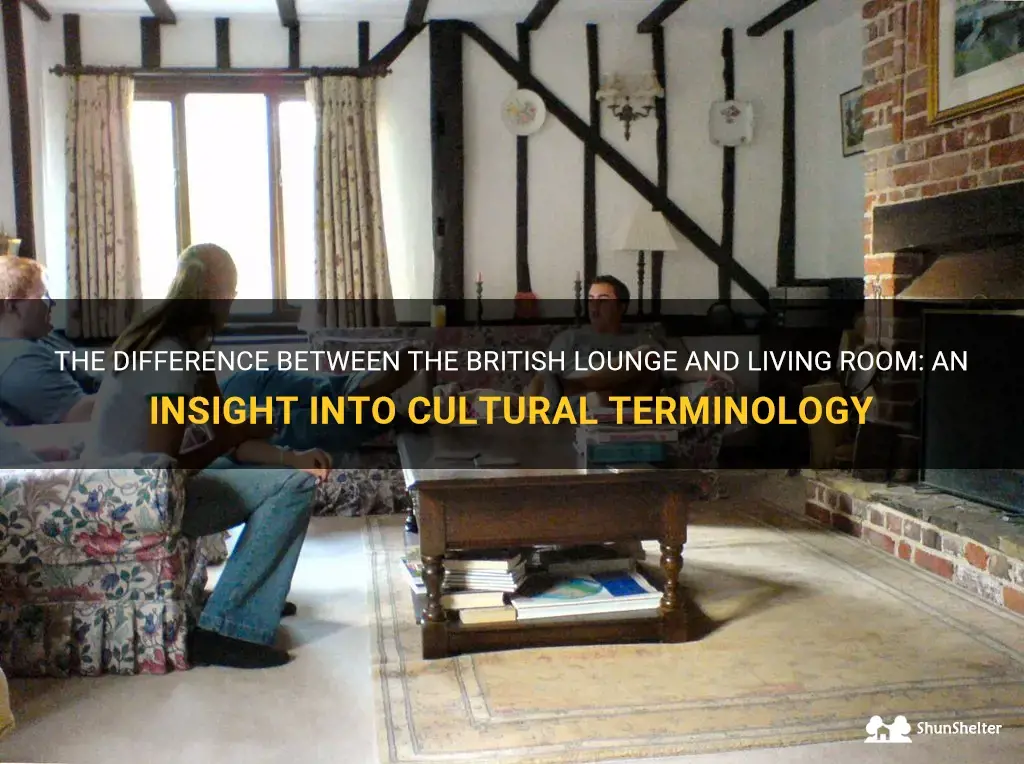
When it comes to the spaces we unwind and entertain in, the terms lounge and living room are often used interchangeably. However, if you ever find yourself in the United Kingdom, you may notice that the locals have their own unique way of referring to this cozy domain. In British English, the preferred term for this area is usually lounge, while living room is less common. Join me as we delve into the British linguistic landscape and discover why the term lounge has become the go-to moniker for this beloved space across the pond.
| Characteristics | Values |
|---|---|
| Term used | Lounge, Living room |
| Usage | To refer to a common area in a house used for relaxing and entertaining guests |
| Size | Can vary in size depending on the house |
| Furniture | Typically includes a sofa, chairs, coffee table, and entertainment center |
| Function | Used for activities such as watching TV, socializing, reading, or playing games |
| Design | Can have various design styles, such as traditional, modern, or eclectic |
| Decor | May include rugs, curtains, artwork, and decorative accessories |
| Lighting | Usually has a combination of ceiling lights, floor lamps, and table lamps |
| Purpose | Provides a comfortable and inviting space for relaxation and entertainment |
What You'll Learn
- Is it true that British people commonly use the term lounge to refer to a living room?
- How does the use of the term lounge in British English differ from the usage of living room in American English?
- Are there any regional variations in the use of lounge in the UK, or is it a universally accepted term?
- Are there any situations in which British people might prefer to use the term living room instead of lounge?
- What historical or cultural factors might have influenced the preference for lounge in British English?

Is it true that British people commonly use the term lounge to refer to a living room?
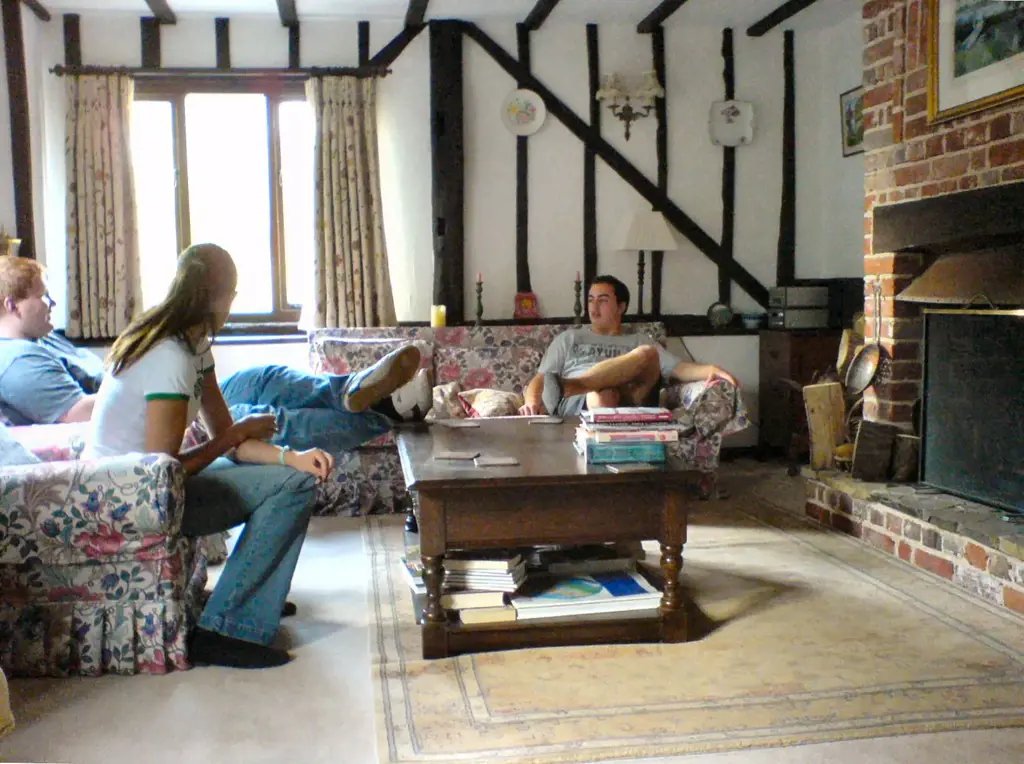
Yes, it is indeed true that British people commonly use the term "lounge" to refer to a living room. The use of the word "lounge" in this context is rooted in British English and is widely understood and used throughout the country.
The term "lounge" is synonymous with the American English word "living room" and is used to describe the area in a house where the family typically gathers and relaxes. It is often the central hub of the home, where people spend their leisure time, entertain guests, and engage in various activities such as watching television, reading, or socializing.
The use of the term "lounge" to refer to a living room has a long history in the United Kingdom. It can be traced back to the Victorian era when the concept of a separate and designated room for leisure activities started to gain popularity among the upper-middle class. These rooms were often decorated with elegant furniture, comfortable seating, and luxurious amenities, giving rise to the term "lounge."
The popularity of the term grew over the years, and it became a common part of British vocabulary. Today, if you were to ask a British person where their living room is, they are likely to respond by saying "in the lounge."
One reason for the preference of the term "lounge" over "living room" in British English could be attributed to the cultural differences between the United States and the United Kingdom. The British tend to value leisure time and relaxation more, and the term "lounge" conveys a sense of comfort and relaxation that may not be as strongly associated with the term "living room."
Furthermore, the term "lounge" is also used to refer to a public waiting area, such as in airports or hotels. This usage may have influenced the adoption of the term to describe the leisure area in a home, as it reflects the idea of a comfortable and inviting space where one can relax and wait.
In conclusion, it is true that British people commonly use the term "lounge" to refer to a living room. The term has a long history and cultural significance in British English and is widely understood and used throughout the country. It conveys a sense of comfort and relaxation, reflecting the importance placed on leisure time in British culture.
Transform Your Living Room with a Console Table
You may want to see also

How does the use of the term lounge in British English differ from the usage of living room in American English?
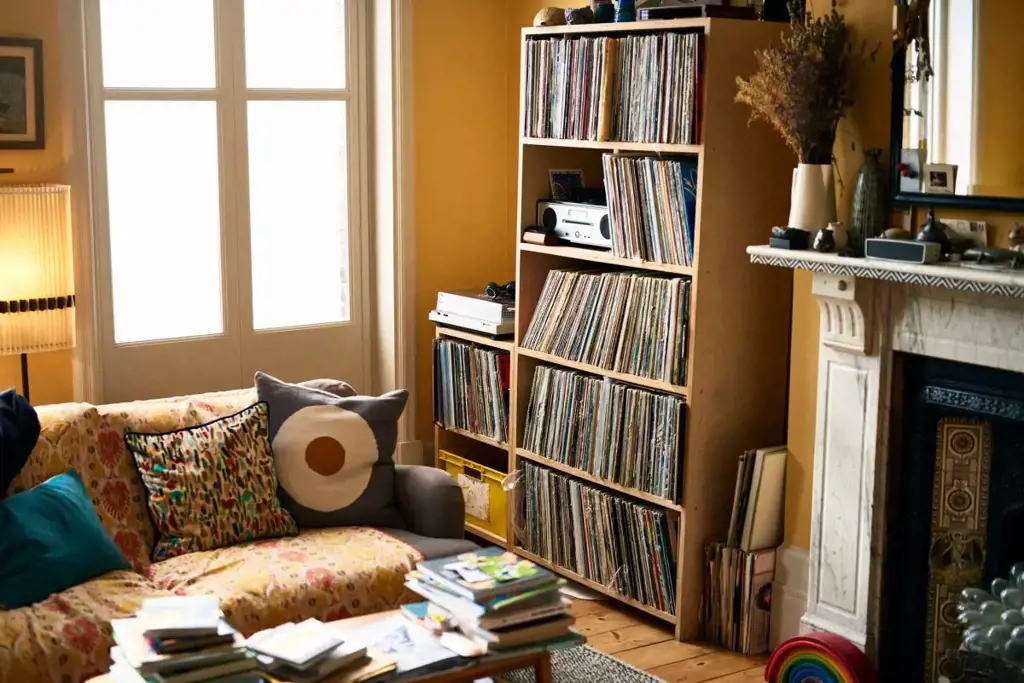
When it comes to language, there are often subtle differences between British English (BrE) and American English (AmE). One such difference can be found in the terms used to describe a common area in a house - the lounge and the living room. While they refer to the same physical space, the usage of these terms in BrE and AmE can vary in a few key ways.
In British English, the term "lounge" is commonly used to describe a comfortable room in a house where people relax and spend their leisure time. The lounge is typically associated with a more casual and informal atmosphere. It is often seen as a space where one can unwind, socialize with friends, watch television, or read a book. In some cases, the lounge may also be referred to as a "sitting room" or "front room."
On the other hand, in American English, the term "living room" is the preferred term to describe the same space. The living room is typically viewed as a more formal area of the house, where guests are entertained and formal gatherings take place. It is often decorated with more elegant and sophisticated furniture and serves as a focal point for the home. The living room may also be referred to as a "parlor" or "drawing room," although these terms are less commonly used today.
The difference in usage between "lounge" and "living room" can also be attributed to cultural factors. In British culture, the concept of lounging and spending leisure time in a relaxed manner is deeply ingrained. The term "lounge" captures this idea of relaxation and informality. In contrast, American culture places more importance on formality and presentation, hence the preference for the term "living room" to describe the central area of the house.
It is worth noting that these terms are not set in stone and can vary depending on personal preference and regional dialects within both British and American English. Some individuals in the UK may use the term "living room," while some Americans may prefer the term "lounge." Additionally, there may be overlaps in usage, especially in more modern settings where the lines between informal and formal spaces have blurred.
To illustrate the difference between the usage of "lounge" and "living room," let's consider an example. Imagine a British family inviting their friends over for a casual gathering. They would likely say something like, "Come join us in the lounge for a cup of tea and some friendly conversation." In contrast, an American family hosting a formal dinner party would say, "Please make yourself comfortable in the living room while we prepare dinner."
In conclusion, while both the terms "lounge" and "living room" refer to the same physical space within a house, the usage of these terms in British English and American English can differ. "Lounge" is commonly used in British English to describe a casual and relaxed space, whereas "living room" is the preferred term in American English and carries connotations of formality and elegance. However, it is important to recognize that these terms can vary depending on personal preference and regional dialects.
Enhancing Safety and Care: Exploring the Benefits of Cameras in Assisted Living Rooms
You may want to see also

Are there any regional variations in the use of lounge in the UK, or is it a universally accepted term?
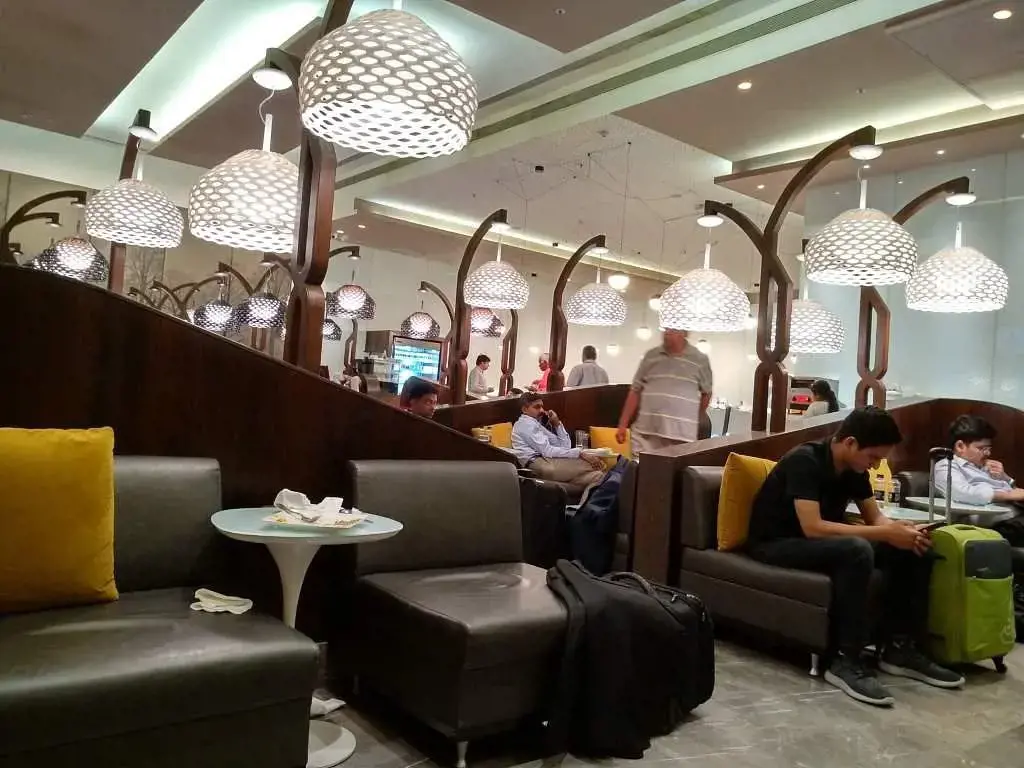
The term "lounge" refers to a comfortable area in a home or public space where people can relax, socialize, or wait. It is commonly associated with a living room or a waiting area in a hotel, airport, or other commercial establishments. While the term is widely used and understood throughout the UK, there might be some regional variations in its use and interpretation.
In general, the term "lounge" is universally accepted across the UK, and its meaning remains consistent. However, there may be slight differences in how it is used and the activities associated with it in different regions.
For example, in some parts of the UK, the term "lounge" is used interchangeably with "living room." People might refer to their living room or sitting room as the lounge. In these cases, the lounge is typically seen as a more formal and organized space, often used for entertaining guests or special occasions. It may be filled with comfortable seating, a fireplace, and elegant decor.
In other regions, particularly in urban areas, the term "lounge" is also commonly used to refer to a stylish bar or nightclub where people gather to socialize, enjoy music, and have drinks. These lounges often have a trendy and relaxed atmosphere, with plush seating, dim lighting, and a DJ or live music. They are popular destinations for a night out with friends or for special events.
In addition to these variations in interpretation, the use of the term "lounge" can also differ depending on the context. For example, in an airport or train station, the lounge refers to a designated area where passengers can relax, access amenities, and wait for their departure. Airport lounges often provide comfortable seating, refreshments, and sometimes even showers or sleeping facilities.
Overall, while the term "lounge" is generally understood and used consistently across the UK, there may be regional variations in its interpretation and associated activities. These variations often depend on local customs, preferences, and the specific context in which the term is used. Whether it refers to a living room, a stylish bar, or a designated waiting area, the lounge remains a space for relaxation, socialization, and comfort.
Is It Possible to Have a Security Camera in a Shared Living Room with a Roommate?
You may want to see also

Are there any situations in which British people might prefer to use the term living room instead of lounge?
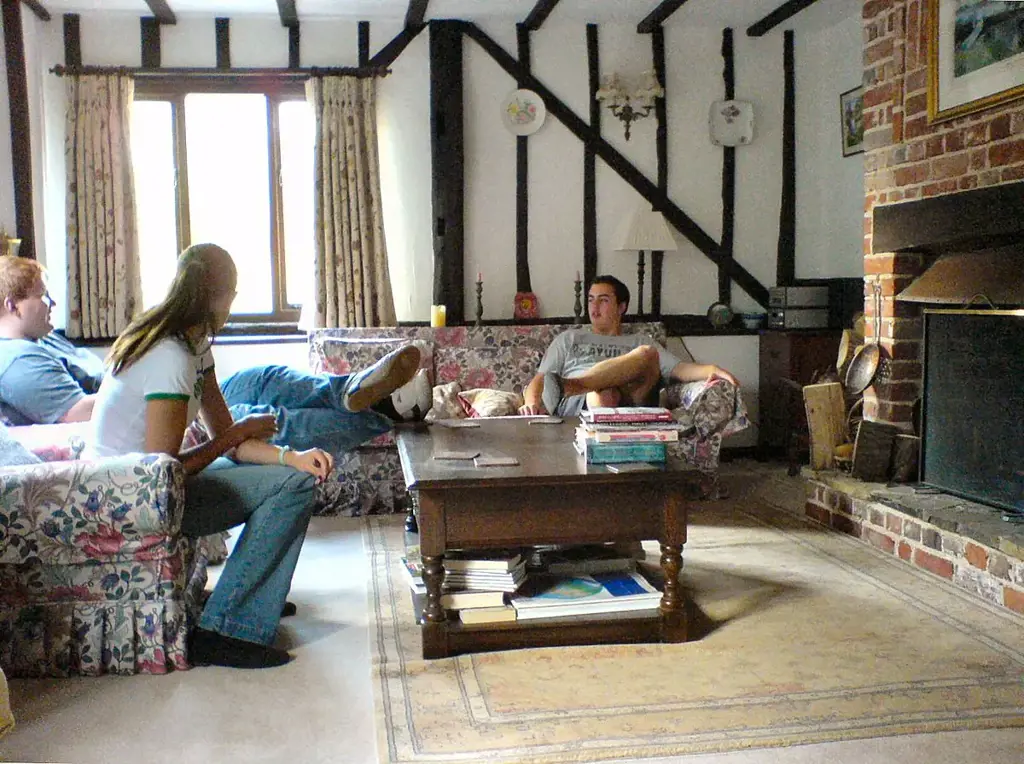
The terms "living room" and "lounge" are often used interchangeably in British English to refer to the main communal space in a house where people gather to relax and socialize. However, there are certain situations in which British people might prefer to use the term "living room" instead of "lounge."
One possible reason for using the term "living room" is when describing a more formal and traditional space. In some homes, particularly older or more traditional ones, the main communal space may be designed and decorated to reflect a more formal style. In this case, referring to the room as a "living room" is more appropriate as it conveys a sense of elegance and refinement. The term "lounge," on the other hand, is often associated with a more casual and relaxed atmosphere.
Another situation in which the term "living room" might be preferred is when discussing interior design or home décor. The term "living room" is commonly used in design magazines, blogs, and other sources of inspiration for homeowners. It has become the standard term when talking about decorating and styling this important space. Using the term "lounge" in this context may be seen as less professional or knowledgeable.
Furthermore, the term "living room" is often used when referring to the main communal space in a house during real estate transactions or property listings. Real estate agents and property professionals commonly use the term "living room" in their descriptions as it is more widely recognized and understood by potential buyers. It gives a more formal and official tone to the description and can be seen as a more professional choice of terminology.
It is important to note that the choice between "living room" and "lounge" is largely subjective and personal preference. Some people may use the terms interchangeably without any particular reason. Others may prefer one term over the other based on their individual experiences and upbringing.
In conclusion, while both "living room" and "lounge" are commonly used terms to refer to the main communal space in a British home, there are situations in which one term might be preferred over the other. Using the term "living room" can convey a more formal and traditional atmosphere, and is often used in discussions of interior design and real estate. However, the choice between the two terms is ultimately a matter of personal preference.
Enhancing Your Living Room with 6-Inch LED Can Lights
You may want to see also

What historical or cultural factors might have influenced the preference for lounge in British English?
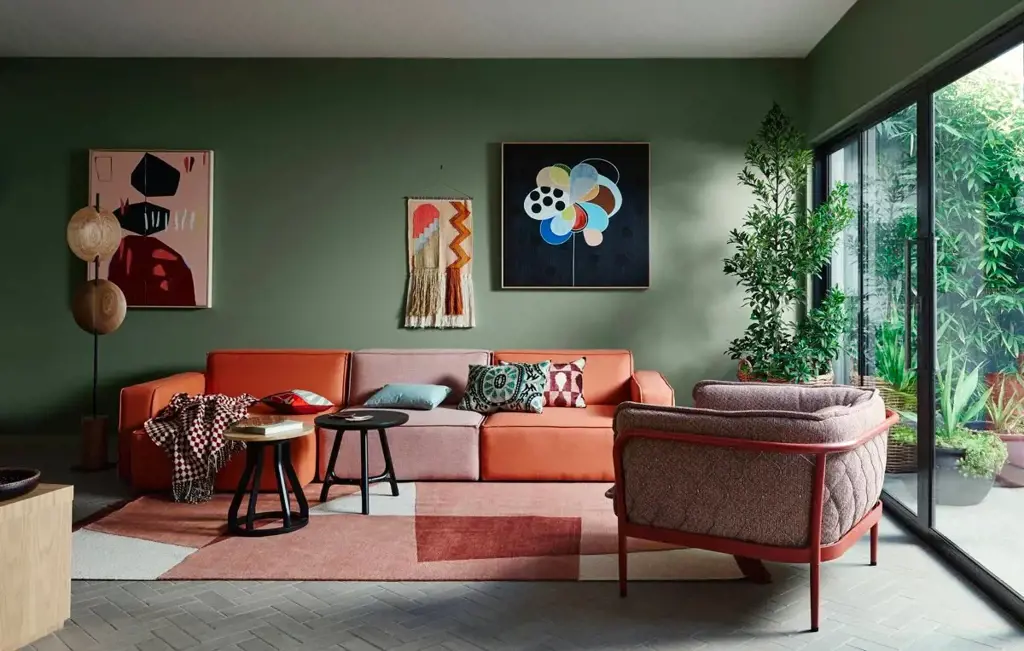
The preference for using the word "lounge" in British English can be traced back to historical and cultural factors that have shaped the language over centuries. To understand why the word "lounge" is popular, it is essential to delve into the history of the British Empire, the influence of French culture, and the British class system. These factors, combined with the ever-evolving nature of the English language, have contributed to the enduring use of "lounge" in British English.
One historical factor that influenced the preference for "lounge" is the British Empire. During the height of its power, the British Empire spanned across continents and encompassed diverse cultures. This vast empire brought the English language into contact with different societies, resulting in the adoption of words from various languages. The word "lounge" originated from the Old French word "lunge," which referred to a long seat or couch. The French influence on the English language, brought about by the Norman Conquest of England in the 11th century, played a significant role in introducing "lounge" into the English lexicon.
Another cultural factor that affected the preference for "lounge" in British English is the enduring influence of French culture on British society. The upper classes of Britain often aspired to French elegance and sophistication. This influence can be seen in the language used to describe furniture and living spaces. The word "lounge" conveyed a sense of luxury and comfort associated with French salons or drawing rooms. As a result, "lounge" became a popular term to describe a comfortable seating area in British homes.
The British class system is also a determining factor in the preference for "lounge" in British English. In the Victorian era, the upper and middle classes sought to distinguish themselves from the working class through their language and behavior. The use of specific terms, such as "lounge," helped assert their social status and separate themselves from the common masses. The idea of a designated space for relaxation and leisure, separate from the more functional areas of the house, became a symbol of status and refinement.
As the English language continues to evolve, the influence of historical and cultural factors on word usage persists. Although the British Empire has long dissolved, and the influence of French culture has waned, the use of "lounge" remains prevalent in British English. It has become ingrained in the language's vocabulary, maintaining its association with comfort, luxury, and social status. Moreover, as language constantly adapts to the changing needs and desires of its speakers, the preference for "lounge" in British English continues to be reinforced through its widespread use in various media and everyday conversations.
In conclusion, the historical and cultural influences of the British Empire, French culture, and the British class system have all played a part in shaping the preference for "lounge" in British English. The word's association with luxury, comfort, and social status has made it a popular term to describe a comfortable seating area in British homes. As the English language evolves, the continued use of "lounge" is a testament to the enduring impact of history and culture on language.
Tips for Decorating a Hutch in the Living Room
You may want to see also
Frequently asked questions
In Britain, the term "living room" is more commonly used than "lounge." While both terms refer to the same space in a house where people relax and socialize, "living room" is the preferred term in British English.
There can be slight regional variations in the use of the terms "lounge" and "living room" in Britain. In some parts of the country, such as the North of England, "lounge" may be used more frequently. However, overall, "living room" is the more widely used term across Britain.
While both terms are widely understood in Britain, "living room" is generally considered to be the more standard and formal term. "Lounge" is often used in a more casual or informal context. However, in everyday conversations, the two terms are often used interchangeably without any significant difference in meaning.
When referring to the main sitting area in a British home, it is safe to use the term "living room." This is the most commonly used term in Britain and will be readily understood by everyone. If you prefer a more casual or informal tone, you could also use the term "lounge," although it may not be as universally recognized.







